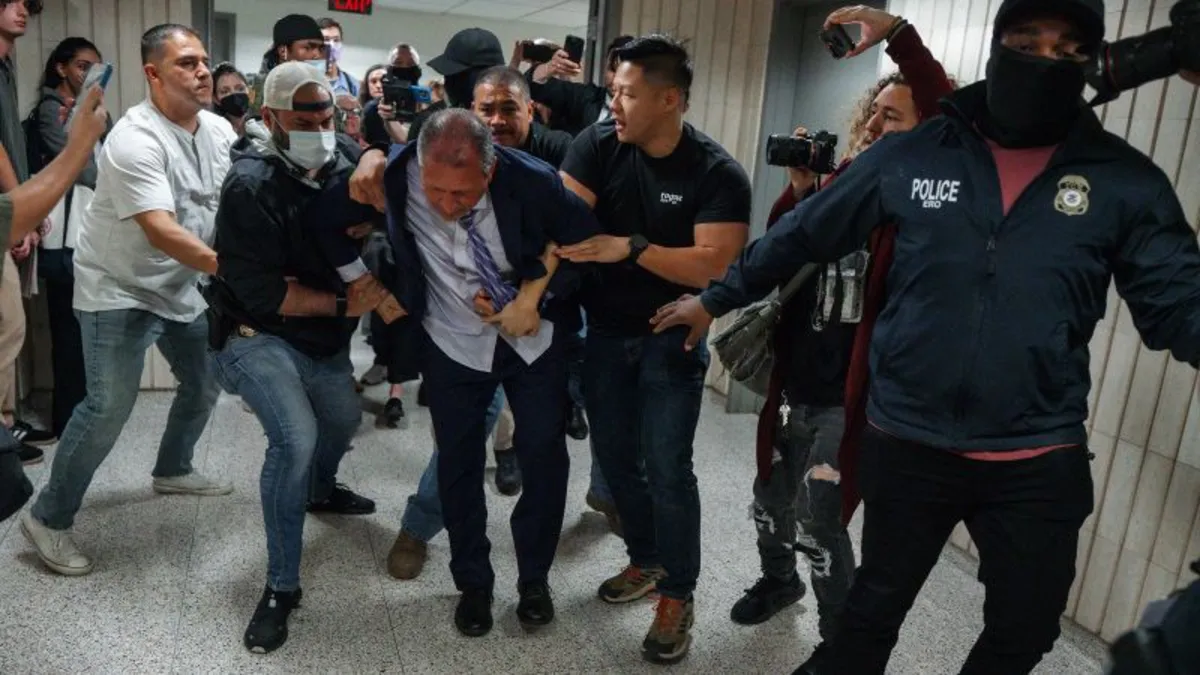
New York City Comptroller and mayoral candidate Brad Lander was arrested at Manhattan’s immigration court on Tuesday, becoming the latest elected official detained amid the Trump administration’s aggressive deportation policies. This incident is part of a troubling pattern, with at least four other officials facing similar confrontations with law enforcement in recent weeks. Here’s what we know about the situation.
Lander had been actively monitoring immigration court activities and assisting asylum seekers as they exited their court appointments. On Tuesday, he reportedly stood beside a man and locked arms with him as federal officers approached. The situation escalated when the officers requested Lander to step aside for the arrest. As Lander and bystanders attempted to block the arrest, a scuffle ensued. “Anyone can see from the video that I posed no danger to anyone,” Lander stated in an interview with CNN after his release.
Footage from the incident shows Lander challenging federal officers about their authority, stating, “You don’t have a judicial warrant.” As officers struggled to arrest the man, they forcibly restrained Lander, who was heard arguing about his rights. He asserted, “You don’t have the authority to arrest US citizens; I’m not obstructing. I’m standing right here in the hallway.”
Since January, several directives from the Department of Homeland Security (DHS) have allowed Immigration and Customs Enforcement (ICE) officers to conduct enforcement actions in or near courthouses, provided they have “credible information” regarding targeted individuals. Court hallways are considered public spaces, which means authorities are not required to obtain a warrant in order to make arrests in these areas.
Following his release, Lander expressed concerns about the treatment of migrants in the immigration system, stating that many are “stripped” of their due process rights. He noted that asylum seekers often appear in court without legal representation and may not understand that they could be arrested even if their cases are dismissed. “I’m grateful to hear that the charges are not being brought, but if they are, I’ve got a lawyer,” he added.
In a related incident, US Democratic Senator Alex Padilla was forcibly removed from a news conference in Los Angeles last week. Padilla, who is California’s first Latino senator, attempted to ask Homeland Security Secretary Kristi Noem a question when law enforcement intervened. He described the ordeal as peaceful until he was quickly removed and handcuffed by officers who believed he posed a threat. Noem later stated that this was a misunderstanding, though videos show Padilla identifying himself as he was being taken away.
Newark Mayor Ras Baraka also faced arrest in May after trying to enter an immigration detention facility alongside congressional representatives. He was charged with trespassing, which was later dropped, and he maintained that he did not do anything wrong. Baraka has been vocal against the Trump administration's immigration policies and has protested against the opening of new detention centers.
Democratic Representative LaMonica McIver was indicted for allegedly obstructing immigration officers outside the same New Jersey detention center where Baraka was arrested. McIver has defended her actions as part of her duties as a congresswoman, stating that the charges are baseless. Her attorney has indicated they will challenge the allegations in court.
Moreover, Milwaukee Judge Hannah Dugan was arrested in April for allegedly helping a defendant evade arrest from immigration officials in her courtroom. Witnesses reported that she confronted federal agents, demanding they leave the courthouse. The Wisconsin Supreme Court has temporarily prohibited her from exercising her judicial powers while the case is pending.
The arrests of these elected officials highlight the ongoing tensions surrounding immigration enforcement in the United States. As the Trump administration continues its crackdown on immigration, officials like Lander, Padilla, Baraka, McIver, and Dugan are increasingly finding themselves on the front lines of the battle over immigrant rights and due process.